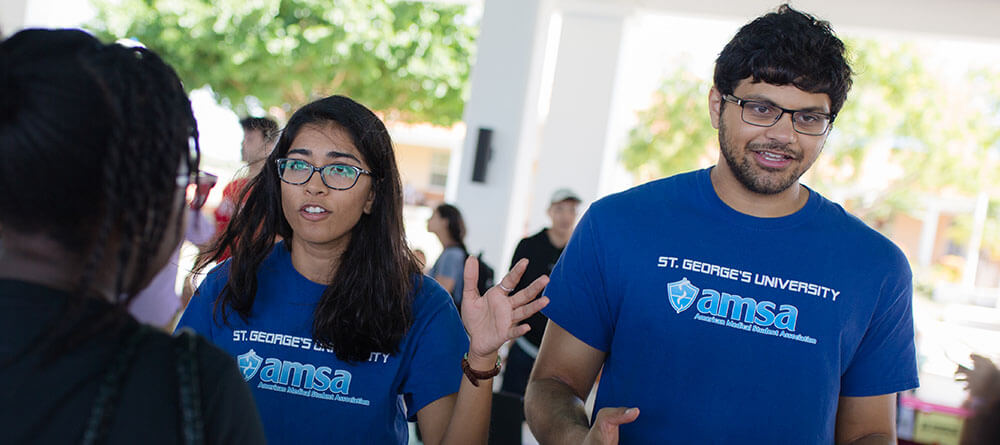There’s a lot that goes into applying to medical school. The first order of business is figuring out when applications are open and are due. Based on that, you can create a plan for completing your medical school applications.
With those dates, you can created a timeline, determine which schools to target, and gather all the appropriate materials. There’s clearly a lot to sort out.
The good news is you can easily start your research right now. And we’re here to help.
7 common medical school application questions
It’s normal to have questions when applying to medical school. We’re here to answer your pressing inquiries to help guide you through the process.
1. What does a medical school application include?
Most pre-med students apply to programs using the American Medical College Application Service (AMCAS) from the Association of American Medical Colleges (AAMC). You’ll fill out information regarding your background, work experience, and extracurricular activities, but there are many other requirements as well.Aspiring medical students also need to:
- Take the Medical College Admission Test (MCAT)
- Obtain letters of recommendation
- Write a personal statement and other essays
- Complete a number of required courses
- Attending medical school interviews
It’s also worth noting that AMCAS isn’t the only way to submit medical school applications. Students interested in attending osteopathic medical schools or programs in Texas apply through separate application services. International programs may offer the additional option of completing their own institution’s application or allow you to use one of the services already mentioned.
2. When should I start working on my applications?
First you will want to find out when do medical school applications open and when they are due. Using that date, you can work backward to create a schedule. It is important to also understand elements that take a significant amount of time to complete. That means you’ll be working on your application long before you actually start using AMCAS. You may even need to complete additional coursework to satisfy any prerequisites if you’ve already graduated.Gaining exposure to medicine also takes time. Some applicants accumulate work experience over several years by shadowing physicians, working as a scribe, or conducting research.A concrete timeline becomes clearer in the spring prior to your intended start date. If you didn’t take the MCAT in the fall, you should sit for the exam in April or May. It’s also a good idea to submit your letters or recommendation and school transcripts to AMCAS as soon as you can. Most schools’ deadlines aren’t until October or later, but the rolling admissions system means it’s better to apply sooner. You can start submitting applications in May.
3. Which medical schools should I apply to?
Medical school applicants often make the mistake of creating a selection list that is too narrow. That could mean they focus all their efforts on reach schools, frame their entire application to please one program, or automatically discount a school based on a misconception.So, how do you choose? It’s important to evaluate all the important factors and find the right fit. You obviously want to attend a program that gives you a great education. Look into residency placements and other student performance data. And don’t forget to consider your personal goals and preferences.
4. How many schools should I apply to?
It might sound extreme, but the average student submits 17 applications. This is a pretty good benchmark when you consider how competitive the applicant pool is, though you may choose to submit a few more or less. Determining which schools to apply to should be based on finding programs that meet your specific criteria and less about trying to hit a quota.
5. How much does it cost to apply to medical school?
How much you spend during the application process depends on how many schools you apply to, how many interviews you attend, and other factors. The initial AMCAS application fee, which covers one school, is $175 in 2023. You’ll spend $45for each additional school. If you apply to 16 schools, for example, your AMCAS fee would be $850. Individual schools may also charge additional fees, which are typically around $100.You also need to account for test fees and interview travel expenses. It costs $335 in 20223 for a standard registration for the MCAT exam. Travel expenses are a lot more variable. The final cost will depend on how many interview invitations you receive, your choice of accommodations, and the mode of transportation you use.

6. Who will evaluate my medical school application?
Once a school receives your application, it will go to the admissions committee. Committees typically include faculty members and individuals from the school’s leadership team. Some programs even include upper-level students and individuals from the community.The way your application is reviewed is also different for each school. Some programs automatically discount students who fall below a certain GPA or MCAT threshold before committee members see the applications. Programs that use holistic reviews, on the other hand, consider your entire application from the very beginning.
7. What happens if medical schools reject my application?
Even with loads of preparation and hard work, some promising students are ultimately rejected from medical schools. Given all the time and effort put into the process, this can be incredibly disheartening. Give yourself time to recover, and then figure out how you want to proceed.Some applicants repeat the same process the following year and see the same lackluster results, so be smart about your strategy. This might mean considering different medical schools. Many physicians have been surprised to discover that attending a Caribbean med school program was actually the best route for them.
Setting Forth on Your Medical Journey
Armed with this knowledge, steer your medical school application with confidence. Prioritize deadlines, be strategic in school selections, and give each application aspect its due time.
For a comprehensive guide on your med school journey, explore “The Pre-Med Student’s Guide to Planning Your Medical School Application Timeline.”
*This article was originally published in 2021. It has since been updated to include information relevant to 2023.

